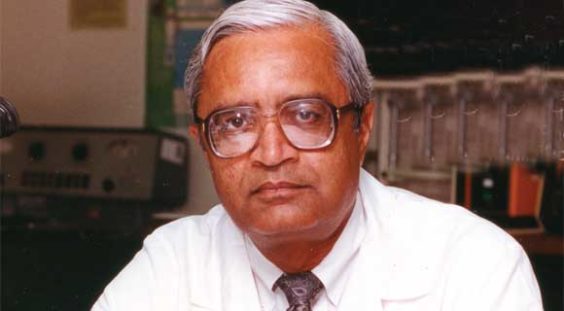DR. ARVIND DHOPLE: Make Aging Time of Opportunity, Growth and Exploration
By Arvind M. Dhople, Ph.D., Professor Emeritus, Florida Tech // August 15, 2020
'Age is Inevitable. Aging Isn't'

Baby boomers are the demographic cohort following the “Silent” or “Great” generation.
Although there are no precise dates for when the Baby Boomer generation starts or ends, demographers and researchers typically use starting birth years ranging from the early-to-mid 1940s and ending birth years ranging from 1960 to 1964.
With identity politics dominating our culture and one in eight American adults being over 65 years of age, most “Boomers,” who now are identified as “aged” or “elderly,” have collectively become a force to reckon with. In fact, by 2030 it is projected that 1 in 5 American adults will be 65 or older.
That having been said, here are some fascinating facts and cuisine for contemplation (food for thought) about today’s over-the-hill-gang.
Nobel Prize Winners

Albert Einstein famously said, “A person who has not made the great contribution to science before the age of 30 will never do so.” This year’s Nobel Prize winners in the sciences have shown just how wrong he was. Nine out of ten of these 2017 honorees are over 70:
- Physics: Barry C. Barish (81), Kip S. Thorne (77), and Raines Weiss (85)
- Chemistry: Jacques Dubochet (75), Richard Henderson (72), and Joechim Frank (77)
- Medicine: Jeffrey C. Hall (72), Michael Rosbash (73), and Michael W. Young (68).
- Economics: Richard H. Tharel (72)
Life Expectancy
Life expectancy in the U.S. is up 43 percent since 1900, and the number of Americans who were 80 or older jumped from 374,000 at the beginning of the century to 2.3 million in the late 1950s. The 2010 U.S. census counted about 8.4 million octogenarians, and 1.5 million who were even older.
Close Friends Important in Old Age

A report in “Personal Relationships” (TIME, June 26, 2017), which included 270,000 people, found that having close friends in old age was a stronger predictor of physical and emotional well-being than close family connections.
The Grandparent Boom
Experts agree that the more grandparents there are, the better for all involved. Grandparenting is healthy for all adults, and being in touch with the younger generations literally beefs up the immune system.
The baby boom has become the grandparent boom. There are now more grandparents in the U.S. than ever before – some 70 million, according to the latest census. That’s a 24 percent increase since 2001. In fact, of all adults over 30, more than 1 in 3 were grandparents as of 2014.

Aging is Just Living
People don’t withdraw from society because of a certain age. Some aspects of life get a little tougher as you go along, and some get a little easier, but it’s part of being alive. The words of 92-year-old football coach and motivational speaker Marv Levy ring so true: “Age is inevitable. Aging isn’t.”
Early Boomers by the Numbers
- Babies born in 1946 would have turned 70 last year. Of the 3.4 million born in the U.S. in 1946, 2.1 million are still living.
- Education: 30 percent are college graduates, 14 percent hold advanced degrees
- Wealth: $55,000 median household income; 78 percent live in a single-family home
- Marriage: 62 percent married once; 23 percent married twice; 9 percent married three or more times; 6 percent never married
- Politics: 38 percent democrats; 36 percent republicans; 12 percent independents; 13percent no affiliation
- Military service: 40 percent male; 1 percent female.
- Ethnicity: 76 percent white; 9 percent black; 8 percent Hispanic; 5 percent Asian; 2 percent other
100 Million Shades of Gray
How people age differs widely based on gender, race, ethnicity and, of course, attitude.
Some Americans see life after 50 as a period of decline, but our perceptions often don’t match reality. The convergence of longer life expectancy and technological advances has given many of us 30 years of bonus time for growth, new opportunity and exploration.

Most older people are contributors, not burdens. People over 50 accounts for more than $7.1 trillion in U.S. annual economic activity. By 2032, that is expected to rise to more than $13.5 trillion.
Sound Bites
- You know you’re getting older when you’re more worried about what time the party ends than when it starts.
- Anybody who is still doing at sixty what he/she was doing at twenty wasn’t doing much at twenty.
- Aging: I am not young, but I don’t feel creaky and old.
- We worry too much about something to live on, and too little about something to live for.
- Too many folks spend their lives aging, rather than maturing.
- You are old when regrets take the place of dreams.
- The scary thing about middle age is knowing that you are going to outgrow it.
- A joyous occasion is never quite as wonderful as when it becomes a memory.
And Finally
There’s an old saying: “It’s not about adding years to your life but adding life to your years.”

ABOUT THE AUTHOR
Dr. Arvind Dhople graduated from the University of Bombay and then joined Johns Hopkins University School of Public Health, first as a postdoctoral fellow and then Asst. Professor. In 1980, he joined Florida Tech as a Professor and Director of their Infectious Diseases Lab. His specialty is microbial biochemistry and he performed research in leprosy and tuberculosis. He is a Fellow of the American Academy of Microbiology and has published nearly 150 articles in peer-reviewed journals. He has also served as an advisor to the World Health Organization, National Institutes of Health, German Leprosy Relief Association, and the Bill and Melinda Gates Foundation. Currently, he is Professor Emeritus at Florida Tech and a free-lance writer.
CLICK HERE FOR BREVARD COUNTY NEWS














